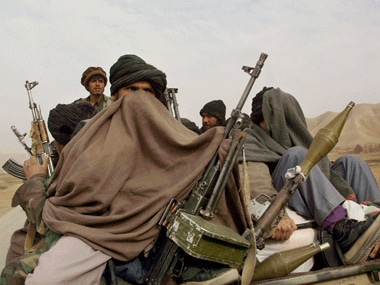 The war in Afghanistan is off the rails and the United States is desperate to negotiate a deal with the Taliban to end its involvement in the 17-year-long conflict. The Taliban is more than happy to negotiate the terms of US withdrawal — but if and only if an accord is reached on their terms. Because if a so-called peace agreement can be reached, you can be sure it will be one that will not benefit the Afghan people, the US, or the region.
The war in Afghanistan is off the rails and the United States is desperate to negotiate a deal with the Taliban to end its involvement in the 17-year-long conflict. The Taliban is more than happy to negotiate the terms of US withdrawal — but if and only if an accord is reached on their terms. Because if a so-called peace agreement can be reached, you can be sure it will be one that will not benefit the Afghan people, the US, or the region.
Hopes for a deal with the Taliban are high after US officials began to directly engage with representatives of the organisation earlier this year. Just last week, the Taliban attended a conference in Moscow hosted by Russia. While the US and Afghan governments did not send official delegations, representatives did attend.
At the conference, the Taliban laid its outs demands for 'peace' in Afghanistan. Before talks could begin, the Taliban insisted its leaders must be removed from the United Nations Sanctions list, its members freed from prisons, its political office be formally recognised, and the end of 'poisonous propaganda against the Islamic Emirate of Afghanistan.'
The last demand is telling. In its official statement at the Moscow conference, the Taliban referred to itself as the 'Islamic Emirate of Afghanistan' — a staggering 61 times. This is the name of the Taliban’s government prior to the US invasion in 2001 after al Qaeda’s attack on 11 September.
The Taliban has insisted that the Islamic Emirate of Afghanistan, and not the Afghan government, is the true representative of the Afghan people. The 'un-Islamic' Afghan government is merely a “stooge” and “puppet” of the West, the Taliban says, and it refuses to negotiate or share power with it.
Once the Taliban’s pre-conditions for talks are met, it insists that in order for there to be peace, US and NATO forces must withdraw from the country. Then, the Taliban says, there can be peace.
While some may dismiss the Taliban's demands as merely its hard line initial position that can be whittled down in negotiations, it has held firm on these demands for well over a decade. When the Obama administration attempted to negotiate peace with the Taliban during and after the Afghan surge, the Taliban did not budge on its demands. The Taliban was, however, able to extract concessions, such as the opening of its political office in Qatar and the release of five dangerous leaders who were held at Guantanamo, at zero cost. After extracting concessions, the Taliban walked away, leaving US efforts to cut a deal in shambles.
How did we get here? In August, 2017, President Donald Trump, in a nationally televised speech, announced his plan to adjust strategy in Afghanistan after the Taliban was making military gains. The US planned to increase support to the Afghan security forces and put more military pressure on the Taliban, in an effort to force it to the negotiating table, while also persuading Pakistan to end its support for the deadly insurgency, Trump said. Within six months of Trump’s announcement of the change in strategy, the US gave up on trying to deal a military blow to the Taliban and jumped right to negotiations.
The Taliban, sensing the West’s desperation to end the war, ramped up its military offensive and is bleeding Afghan forces. Taliban fighters briefly took control of parts of two provincial capitals in May and August, and have overrun numerous military bases and several districts. Casualties among Afghan security personnel are at an all time high. The failure of the demoralized Afghan security forces to defend the rural areas of Afghanistan, which are used by the Taliban to attack more populous parts of the country, has fueled the West’s desire to cut a deal with the Taliban. The west is desperate to end its involvement in the war, and the Taliban senses that.
So, under these conditions, is a deal with the Taliban possible? The answer is yes, but it won't be a deal that the Afghan people, the US, NATO, and those in the region who oppose jihadists (read: not Pakistan) will like. It is certainly possible that the Taliban will make some concessions that will placate the West and the Afghan government. However, it is difficult to see how the Taliban can walk back demands that it has held firmly to for over a decade, such as the withdrawal of US forces or its refusal to enter into the Afghan government, while they also still hold increasing leverage in the battle. There has been little reason to concede ground.
If such as deal is made, it will certainly be a deal that will benefit the Taliban. And even if the Taliban makes concessions, without US forces in the country, don’t expect the Taliban to keep its word. Peace with the Taliban will be peace on the Taliban’s terms, and it certainly won’t be kind to those who must live under it.
The author is a Senior Fellow at The Foundation for Defense of Democracies and editor of the Long War Journal
No comments:
Post a Comment